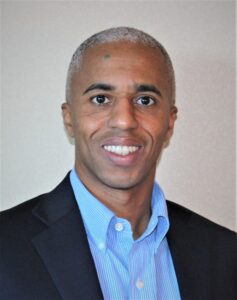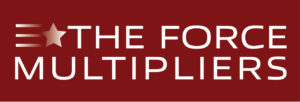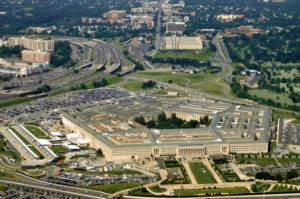
In this monthly column, Defense Daily highlights individuals from across the government, industry and academia whose efforts contribute daily to national defense, from the program managers to the human resource leaders, to the engineers and logistics officers.
Fred Taylor serves as the Vice President of Space and Cyber Applications at Viasat Government, where he leads the company’s efforts developing strategic partnerships and works with federal agencies to integrate space network and communication solutions that support government missions. Previously, Taylor was a Colonel in the Air Force, having last served as the Deputy Director of the Joint Space Operations Center and National Reconnaissance Office Senior Liaison charged with coordinating, planning, integrating, synchronizing and executing space operations to deliver tailored space effects in support of the intelligence community and joint warfighters.
How did you get involved in the defense industry or community?
I grew up in a family of service, with many relatives who have served for decades, including my father, a retired Air Force colonel, and I followed in their footsteps. I graduated from the Air Force Academy and served 26 years, holding a variety of operations, command, acquisition and staff positions within the Air Force, the National Reconnaissance Office, Missile Defense Agency, International Security Assistance Force, and the Office of the Secretary of Defense.
Prior to joining Viasat, I served as the Deputy Director of the Joint Space Operations Center and National Reconnaissance Office Senior Liaison, where I was responsible for coordinating, planning, integrating, synchronizing and executing space operations to deliver tailored space effects in support of the intelligence community and joint warfighters around the globe.
I joined Viasat because I still have the desire to serve, but in a different capacity. As the Vice President of Space and Cyber Applications, I’m still able to work closely with our Space Force partners to further support our nation, our citizens, and our national defense.
What are some challenges you faced working through your career?
In the tech world, things evolve rapidly. The government sector typically does not move as fast. The military is often challenged to learn of and obtain access to new capabilities and then integrate them into operations. I sometimes found it very challenging to move at the pace of innovation and obtain access to these new capabilities or embrace new concepts. There’s also the recognition of “you don’t know what you don’t know” and unsure of whether it exists or can be built, and even if it does, it might be too late by the time you get it.
Did you feel like you always had sufficient mentors and leaders to help guide you? Why/why not?
I’ve been very fortunate to have lots of great mentors over the years, with the greatest mentor being my father. He provided me with guidance as I went through my Air Force career and then into industry. Beyond that, I’ve had some wonderful supervisors and mentors that provided constant feedback on what I was doing right and, even more important, what I could do better. Having this honest feedback has been one of the most powerful things to help me become a better leader. I am very grateful to have had some amazing commanders that personally invested in my professional development and growth.
How do you work to be a mentor yourself to younger counterparts?
Throughout my career, I have prioritized mentoring – up, down, and across to my peers. Mentorship is a cornerstone of how I live. While in the Air Force, I guided and advised young officers and enlisted Airmen and Guardians as they progressed in their careers. At Viasat, I mentor peers and younger program managers and engineers, on top of my obligation to provide the best counsel to everyone I work with. Viasat is a team, so we all need to actively and deliberately make an effort to mentor and advise one another – the better your teammates are, the better your team will be.
What does it mean to be successful in your career field?
Success is how well you contribute and move the team forward – to solve complex problems that enable and advance the mission. At Viasat, we have a very fitting motto: “There’s Always a Better Way,” which emphasizes that success isn’t complacent, but always striving to find better ways to support our customers and our people.
What are some of the under-appreciated positions in the defense field, the unsung heroes or essential cogs in the machine that help the job get done with less recognition?
From an Air and Space Force perspective, it takes a team to build an aircraft. It takes a team to fly and operate a satellite. Many of the folks doing this are young service members, who manage and operate multi-million dollar systems. They are competent professionals who work without complaint and serve with pride. Sometimes you overlook the person that is on a mid-shift in the middle of the night and nothing is going wrong. They are the unsung heroes because they make things function on a daily basis.
Similarly, in industry, we all operate as a team. We have capabilities that, even if you don’t realize it, are supporting our nation, our military and national defense. Everyone in a company – from the IT folks making sure the networks are available, to the folks that are maintaining the buildings – they’re all committed to making the company a stronger, better place.
How can the industry improve in promoting these individuals and building them up?
There’s an easy way to do this and it starts with acknowledging them when you see them. People have a choice on where they work and what they do; show gratitude that they choose to be here. Companies and agencies need to create an environment that makes these individuals feel seen, recognized and appreciated. Beyond that, you can show these individuals that their contribution has benefited the team, including with public and personal recognition, awards, and compensation.
How has the culture changed around diversity within your career?
Over decades, there’s been a greater appreciation for differences, whether it’s of thoughts, skills, gender, experiences, race or anything else. This has made organizations stronger and more effective. Everyone brings something valuable to the table. Even from a technical organization, a historian can be as valuable as an engineer when looking at a problem.
What is your advice for new entrants to the defense/military community?
1) Be a professional. Learn your job and become an expert quickly. Once you’ve figured out your job and get good at it, understand the other functions to better comprehend how it all fits together. I often see people trying to figure out “How do I fit?” or “Where do I fit?” Knowing that you’re there for a reason is critical. It also falls on those who have been there longer or are more senior to help that person see their added value. The better they know their capabilities, the better they do their job.
2) While asking questions is important, be sure to listen and soak it in. Study examples of how to lead, do a technical task, or other job. Learn from everyone, both from their successes and failures.
3) Make sure to have a relationship with your coworkers, regardless of their seniority or tenure at the company. Determine how you can collaborate with them, not only within your specific function, but how you can collaborate with your larger group and with other units.
Ultimately, if you take the initiative and you’re someone that people can trust and want to work with, are eager to learn, want to contribute, and are collaborative, that goes a long way. Don’t be self-promoting, be team-promoting, because at the end of the day, we all want to work with people we know, like and trust.
What do you see as the future of your sector in national defense?
I view satellite communications and connectivity as the future, specifically in terms of the government utilizing more commercial capabilities. The Defense Department is leveraging more and more of those capabilities, which is further enabling the warfighter to connect, stay connected and get real-time data and insights. But as part of this, we’re going to see a greater push towards multi-orbit and multi-network satellite constellations to provide warfighters with ubiquitous, always-on, simultaneous connectivity to support their missions, whether on earth or in space.
Who are the Force Multipliers in your community? Let us know at forcemultipliers@defensedaily.com.












